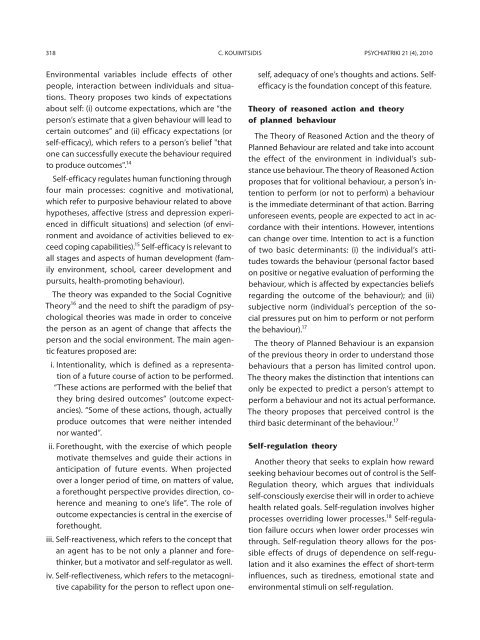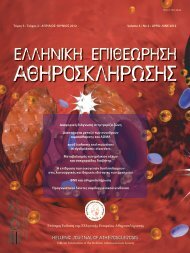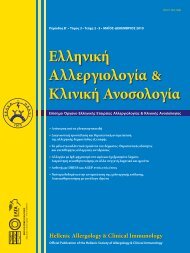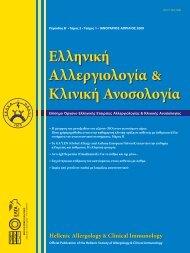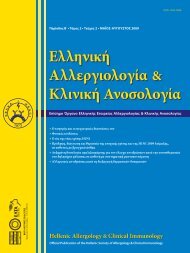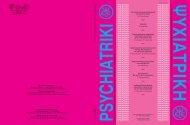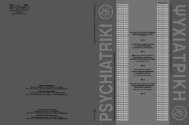ÏÏ ÏιαÏÏικη - ÎÎΤΠÎαÏÏικÎÏ ÎκδÏÏειÏ
ÏÏ ÏιαÏÏικη - ÎÎΤΠÎαÏÏικÎÏ ÎκδÏÏειÏ
ÏÏ ÏιαÏÏικη - ÎÎΤΠÎαÏÏικÎÏ ÎκδÏÏειÏ
- No tags were found...
You also want an ePaper? Increase the reach of your titles
YUMPU automatically turns print PDFs into web optimized ePapers that Google loves.
318 C. Kouimtsidis PSYCHIATRIKI 21 (4), 2010Environmental variables include effects of otherpeople, interaction between individuals and situations.Theory proposes two kinds of expectationsabout self: (i) outcome expectations, which are “theperson’s estimate that a given behaviour will lead tocertain outcomes” and (ii) efficacy expectations (orself-efficacy), which refers to a person’s belief "thatone can successfully execute the behaviour requiredto produce outcomes". 14Self-efficacy regulates human functioning throughfour main processes: cognitive and motivational,which refer to purposive behaviour related to abovehypotheses, affective (stress and depression experiencedin difficult situations) and selection (of environmentand avoidance of activities believed to exceedcoping capabilities). 15 Self-efficacy is relevant toall stages and aspects of human development (familyenvironment, school, career development andpursuits, health-promoting behaviour).The theory was expanded to the Social CognitiveTheory 16 and the need to shift the paradigm of psychologicaltheories was made in order to conceivethe person as an agent of change that affects theperson and the social environment. The main agenticfeatures proposed are:i. Intentionality, which is defined as a representationof a future course of action to be performed.“These actions are performed with the belief thatthey bring desired outcomes” (outcome expectancies).“Some of these actions, though, actuallyproduce outcomes that were neither intendednor wanted”.ii. Forethought, with the exercise of which peoplemotivate themselves and guide their actions inanticipation of future events. When projectedover a longer period of time, on matters of value,a forethought perspective provides direction, coherenceand meaning to one’s life”. The role ofoutcome expectancies is central in the exercise offorethought.iii. Self-reactiveness, which refers to the concept thatan agent has to be not only a planner and forethinker,but a motivator and self-regulator as well.iv. Self-reflectiveness, which refers to the metacognitivecapability for the person to reflect upon oneself,adequacy of one’s thoughts and actions. Selfefficacyis the foundation concept of this feature.Theory of reasoned action and theoryof planned behaviourThe Theory of Reasoned Action and the theory ofPlanned Behaviour are related and take into accountthe effect of the environment in individual’s substanceuse behaviour. The theory of Reasoned Actionproposes that for volitional behaviour, a person’s intentionto perform (or not to perform) a behaviouris the immediate determinant of that action. Barringunforeseen events, people are expected to act in accordancewith their intentions. However, intentionscan change over time. Intention to act is a functionof two basic determinants: (i) the individual’s attitudestowards the behaviour (personal factor basedon positive or negative evaluation of performing thebehaviour, which is affected by expectancies beliefsregarding the outcome of the behaviour); and (ii)subjective norm (individual’s perception of the socialpressures put on him to perform or not performthe behaviour). 17The theory of Planned Behaviour is an expansionof the previous theory in order to understand thosebehaviours that a person has limited control upon.The theory makes the distinction that intentions canonly be expected to predict a person’s attempt toperform a behaviour and not its actual performance.The theory proposes that perceived control is thethird basic determinant of the behaviour. 17Self-regulation theoryAnother theory that seeks to explain how rewardseeking behaviour becomes out of control is the Self-Regulation theory, which argues that individualsself-consciously exercise their will in order to achievehealth related goals. Self-regulation involves higherprocesses overriding lower processes. 18 Self-regulationfailure occurs when lower order processes winthrough. Self-regulation theory allows for the possibleeffects of drugs of dependence on self-regulationand it also examines the effect of short-terminfluences, such as tiredness, emotional state andenvironmental stimuli on self-regulation.


